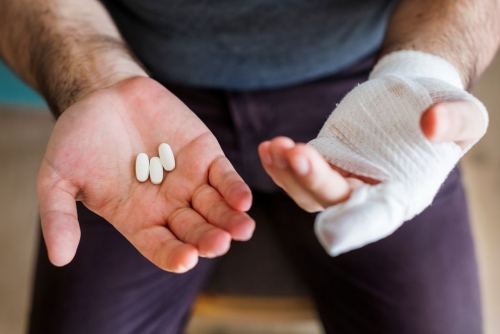An Asian expatriate in Manama, Bahrain was left with a permanent disability after a violent altercation with his roommate, which occurred at their shared accommodation. The victim suffered a partial amputation of his index finger as a result of the incident. The altercation began when the victim’s roommate, who was unable to work due to back pain, started using foul language towards him. The situation escalated when the roommate grabbed the victim by the neck and then proceeded to bite his left hand, specifically his index finger. The attack continued with the roommate striking the victim’s forehead with a bracelet he was wearing.
A witness, another worker living in the same accommodation, confirmed the victim’s account of the events. He stated that a verbal argument turned physical, resulting in the victim’s injury – a cut on his forehead and a severed index finger. The suspect confessed to the charges against him during the investigation, and a medical report confirmed the victim’s partial amputation of his index finger, leading to a 1% permanent disability. The Public Prosecution charged the suspect with assault causing injury resulting in a 1% permanent disability without intent, as well as verbal abuse. The specific charges did not include allegations of defamation. The High Criminal Court has scheduled a hearing for September 16th to issue a verdict in the case, with the suspect remaining in custody.
This incident highlights the serious consequences of violence in shared accommodations and serves as a reminder of the importance of conflict resolution and peaceful coexistence. Physical altercations can lead to life-altering injuries and permanent disabilities, as seen in this case where the victim lost part of his index finger. It is crucial for individuals living together to communicate effectively and address conflicts in a non-violent manner to prevent such tragic outcomes. Legal action is being taken against the perpetrator in this case, with charges of assault and verbal abuse. The criminal justice system in Bahrain is working to ensure accountability and justice for the victim.
The victim’s experience serves as a cautionary tale about the potential dangers of living with roommates and the importance of establishing boundaries and resolving conflicts peacefully. Shared accommodations often require individuals to coexist in close quarters, making it essential for all residents to respect each other’s space and privacy. Violence and aggression have no place in any living situation and can have devastating consequences, as evidenced by the victim’s permanent disability. It is crucial for individuals to seek help and support if they find themselves in an abusive or violent situation, as staying silent can lead to further harm.
The legal proceedings in this case demonstrate the commitment of Bahrain’s justice system to uphold the rights of victims and hold perpetrators accountable for their actions. The suspect facing charges of assault causing injury leading to a 1% permanent disability without intent and verbal abuse will have to face the consequences of his violent behavior. The High Criminal Court’s upcoming hearing will determine the outcome of the case, with the suspect remaining in custody until then. It is essential for the justice system to send a strong message that violence will not be tolerated and that those who cause harm to others will be held responsible for their actions.
As the victim continues to cope with his permanent disability, it is crucial for him to receive the necessary support and assistance to help him navigate the challenges ahead. Physical and emotional trauma resulting from such a violent incident can have long-lasting effects on an individual’s well-being. It is important for the victim to access medical care, counseling, and legal support to address his physical and psychological needs. The community and authorities should rally around the victim to ensure that he receives the help and justice he deserves. This case serves as a reminder of the importance of standing up against violence and supporting those who have been harmed.


























